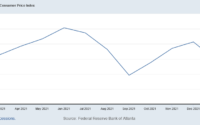Expectations are low as Biden and McCarthy prepare to sit down
As President Joe Biden and House Speaker Kevin McCarthy prepare to sit down Wednesday for their highly anticipated first talks around the debt ceiling, few are expecting much from this initial face-to-face gathering.
On one side, McCarthy and other Republicans have said that a deal needs to include spending caps at previous-year levels or a balanced budget, without specifying the deep cuts such a move would entail. On the other side, Biden and his aides have tried to avoid negotiations altogether, saying the debt limit should simply be raised without any pre-conditions.
Washington and Wall Street observers may be happy with even a whiff of forward progress from the meeting, as the Treasury Department continues its “extraordinary measures” to temporarily stave off a default.
The hope is that both sides find their way to “parameters where there can be a real discussion,” Maya MacGuineas, president of the Committee for a Responsible Federal Budget (CRFB), told Yahoo Finance. That’s the key, she said.
For instance, MacGuineas hopes McCarthy will calm markets by reiterating a pledge not to allow a default under any circumstances, while she said Biden needs to acknowledge that he’ll enter into a discussion that includes the debt ceiling.
These “two pillars of utter sensibility are kind of hard to disagree with,” MacGuineas said.
And the modest expectations have been echoed from political observers to Wall Street analysts from JP Morgan Chase, who recently wrote to clients that they are expecting a deal will eventually be reached, but don’t see it happening until later this year.
The timing is important. The Treasury’s accounting maneuvers are likely to run out this summer and could push the U.S. economy and markets into uncharted territory if it remains a real possibility that the U.S. government won’t be able to pay its bills.
According to a memo released Tuesday morning from two of Biden’s top aides, the president will focus Wednesday on asking McCarthy two questions: Will the Speaker promise to not let an actual default happen under any circumstances and when will the Speaker release a budget detailing the cuts he wants to make?
“President Biden will ask Speaker McCarthy to publicly assure the American people and the rest of the world that the United States will, as always, honor all of its financial obligations,” wrote Brian Deese, director of the National Economic Council, and Shalanda Young, head of the Office of Management and Budget.
McCarthy quickly responded on Twitter, calling the memo “political games.”
The White House is scheduled to release its next budget proposal on March 9, with Biden saying he’ll tell McCarthy: “Show me your budget, I’ll show you mine.”
While often conflated, the budget process and the debt ceiling are different, but negotiators could end up linking the two. At the moment, the deadline for a deal around the debt limit to pay for already committed spending is set to fall sometime this summer, while a deal on spending bills for future spending will not need to be completed until the fall.
House Republicans are reportedly weighing an attempt to delay the debt ceiling timeline in order to line up the deadlines.
‘Our politicians have to level with the American people’
In the meantime, there is unforgiving arithmetic that Republicans have yet to fully address.
One idea floated by House Republicans includes pushing for a balanced budget in 10 years, but reaching that goal by 2032 would require 26% spending cuts across the board, according to an analysis from the CRFB.
And it becomes even more daunting once you start taking things off the table. Putting aside politically popular programs like defense spending, Social Security, Medicare, and veterans benefits means there needs to be 85% cuts everywhere else, the group said.
Yet during a CBS appearance on Sunday, Speaker McCarthy again called for a balanced budget, while simultaneously seeming to rule out reductions to Social Security and Medicare and suggesting he wants to tread lightly on cuts at the Pentagon.
What he returned to again and again was the idea that wasteful discretionary spending is the key, using a version of the word 10 times in just under eight minutes.
While MacGuineas allows there is ample waste in the federal government, focusing on that issue is an old tactic that politicians employ when they want to avoid discussing real policy choices, she said.
“Our politicians have to level with the American people,” she said, adding that Democrats have a similar move when they say that their goals can be achieved by taxing only rich people. “Our fiscal situation is such that in order to get us to a structural sustainable place, we will have to confront real tradeoffs.”
Ben Werschkul is Washington correspondent for Yahoo Finance.
Click here for politics news related to business and money
Read the latest financial and business news from Yahoo Finance
Download the Yahoo Finance app for Apple or Android
Follow Yahoo Finance on Twitter, Facebook, Instagram, Flipboard, LinkedIn, and YouTube
[ad_2]
Source link


